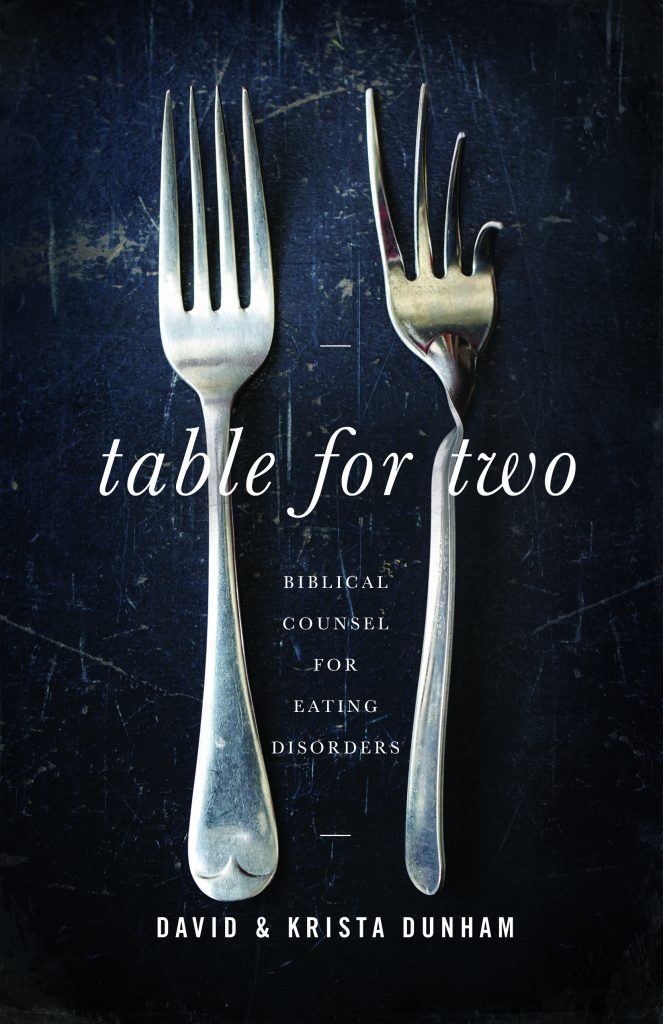At first it was just a diet. Then it was exercise and weigh-ins. Then it was lists of rules and pictures cut from magazines. Then suddenly, a car accident shook my world of order and planning. At one moment, I was standing on the edge of a metaphorical cliff of my own making, and the next I had toppled into a world I had never intended to fall into. My eating disorder felt like normal behavior. It felt like I was simply responding to circumstances. It felt like something that had just happened to me. But beneath the choices and events were the hidden desires and motives of my heart. I wanted something. I longed for something. Somewhere along the way I had I believed the lies that seemed to fill those empty space. Because food was something I had power over, I thought that if I kept all the rules then I could at least have control over one domain. My eating disorder was the serpent in the Garden of Eden whispering, “You can have what your heart desires. You can have control. Just do what I say.”
When I ate all the food in my room at college, then secretly purged, I felt a lot of things, but one of them was confusion. I’d ask myself, “What did I just do? Why did I do that? Where did that come from?” I chalked it up to stress and moved on, but when the behavior didn’t stop and I gathered more unnerving habits, I got scared. I wrote a letter to my long-distance boyfriend (David) and read it to him over the phone. I explained what was happening, and he responded as best as he could at the time. Responses like “stop working so hard” and “you don’t need to lose weight” were fine to comfort me around the edges, but I needed more than simplistic explanations. I needed to allow Scripture, the biblical wisdom of others, and the directing of God through prayer to point me to the motives of my heart. As Proverbs 20:5 says, “the purposes of [my heart were] deep waters,” and I needed help to draw them out.
Out of My Control
David and I decided that it might help for me to transfer schools to be with him. We determined that he could monitor my behavior. He said he’d help me stick to the changes I wanted to make, but our plans were a bit misguided. He could watch me eat and stay with me for most of the day, but I found ways around his supervision. I hid things in my room and exercised at 2 AM while continuing to act like things were fine. But after we got married a couple years later, he came face-to-face with some of those hidden secrets. We finally took the steps to get professional help.
For the next few years, various counselors helped me to develop coping strategies. At times I could control my behavior by moving myself out of a situation or making sure I had a schedule for the day. But my eating issues would always creep up in unexpected ways, such as when I had a crying fit over the lack of fat free salad dressing. One counselor encouraged me to develop my own strategies based on my lifestyle, and so I chose to read my Bible as a way to redirect my thoughts. I often chose to read the book of Psalms because it expressed so many of the emotions I was feeling. It was there that I read of God’s control of events, good and bad. I was faced with the thoughts I had already been having but couldn’t articulate: I want to be in control, but I’m not . . . God is.
Finding Help in Scripture
After David eventually finished seminary, we moved to be close to family. He was hired to work alongside two pastors who were trained in biblical counseling. Understanding that my struggles had not fully gone away, we turned to them for help. It was through asking good questions and guiding me toward applicable Scripture that I finally started to see the things my heart craved. They asked questions like, “What feels good about what you are doing? What are you most afraid of? What do you want most from life?” The answers told me that I wanted control because life all around me felt like it was unpredictable.
There were times my counselor would ask me certain questions and I didn’t know how to answer them. He would often send me home to think and pray over them, along with applicable passages of Scripture. It was then that Psalm 139:23 became a beloved truth as well as an effective strategy. “Search me, O God, and know my heart! Try me and know my thoughts” became my constant prayer. And as I continued to make prayer and reading Scripture a daily practice, God began to reveal parts of my heart that I had never known were there. The world is chaotic, and I thought the answer was to try to gain more control for myself. But the only true answer was to accept that it was truly better for God to have control, not me, because he was perfectly powerful, loving and wise. No matter how much I tried, I could never attest to that myself.
Resting in Christ
We moved one last time after David got a job at another new church. And there, we were met with yet another biblical counselor that picked right up where the others had left off. She showed me that not only did Christ’s death atone for the things I had done wrong, but I came to learn that his perfect obedience is accounted to me as well. Because of his redemptive work, I could be free to live joyfully and obediently, knowing that there was no condemnation for those who are in Christ (Romans 8:1).
I could also rest in the fact that Jesus sympathizes with and understands my struggles. Although Jesus never experienced an eating disorder, he certainly understood the weight of resisting the need for control. He may not have lived my exact experience, but he certainly understood my motive. However, where I had given in, he had perfectly resisted so as not to succumb to sin. In the wilderness, Jesus resisted Satan’s lure to control the entire world if he would simply bow to him (Matthew 4:8-10). Satan offered him ultimate control, but Jesus could push this temptation aside because he knew that God was the one who was in control. Jesus has gone before me in my struggles so that when Satan tempts me to try to find control in a faulty source, I can answer him with, “Worship the Lord your God, and serve him only,” for only he possesses the control that I so desperately craved.
Questions to Consider
If you are struggling with an eating disorder, think honestly about the answers to these questions:
1. Who is someone in your life that you can talk to about your struggles with food and eating issues? How do you respond when they bring up your destructive habits? How do you feel when they keep you from what you want to do?
2. Consider the questions that my counselors asked me: What feels good about what you are doing? What are you most afraid of? What do you want most from life?
3. How often are you inviting God to search your heart? Is it a regular part of your routine? As you submit to what scripture is teaching and humbly listen to God’s observances and directions, what have you come to understand about your heart?
As you make a practice of asking these questions, the answers may start to form a common theme. Control is only one of the possibilities that may come to the surface. You may notice hints of fear, insecurity, punishment, need for protection, a desire to make up for something, or a desire to achieve something. You may find that you are prideful or ashamed. Find someone to come alongside you who can ask you hard questions, spend time reflecting on your motives, and allow God to search the depths of your heart. You may find that your issues breakdown into one or more common motives so that you may begin to form a better strategy in the battle you are facing.
TABLE FOR TWO: BIBLICAL COUNSEL FOR EATING DISORDERS
Breaking free from an eating disorder is difficult and complex. From the unique perspective of a husband and wife team, Table for Two shares Krista Dunham’s journey to freedom from her eating disorder while David shares insights as the loved one coming beside her.






